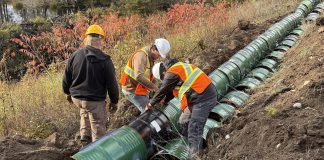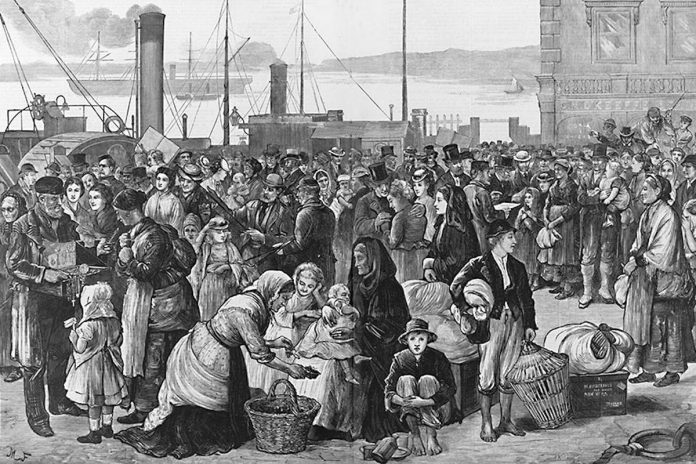
A commemoration 200 years in the making will see a series of events held throughout 2025 to mark the bicentennial of the Peter Robinson Irish Emigration to what was then known as Nogojiwanong — “the place at the end of the rapids.”
In the early 1820s, with Ireland in the midst of severe economic and social challenges, many families faced extreme poverty, poor housing, and food insecurity. Rapid population growth assured little hope of any improvement.
Enter Peter Robinson.
A prominent Canadian politician, he met, in 1822, with British politician Sir Robert John Wilmot-Horton, who proposed an experiment that would see poor Irish families relocated to what was then Upper Canada.
Robinson was provided with 9,678 British pounds (just more than $2.5 million today) in parliamentary grants to underwrite the ambitious emigration plan.
On May 20, 1823, Robinson arrived in Fermoy, County Cork and a call was issued for families to make the trip across the Atlantic Ocean for a fresh start in a strange land. A staggering 50,000 applications were received, from which 2,024 — 385 men, 325 women, and 1,314 children — were chosen.
Fast forward almost two years later to May 6, 1825. From Queenstown harbour in County Cork, the first of nine ships, Regulus, headed out onto the vast expanse of the Atlantic Ocean, transporting 157 souls to a new land. Over the following weeks, eight more vessels — Fortitude, Brunswick, Resolution, Star, Elizabeth, Albion, Amity, and John Barry — followed in due course.
In late June of 1825, the first ships arrived in Quebec City. By way of Kingston and Cobourg, a subsequent river and overland journey brought the families to the designated settlement area of what is now Peterborough County where, provided land, tools, and 18 months’ provisions, the hard work of clearing and preparing the land for farming began as the settlement formed.
A review of each ship’s passenger roster reveals family surnames well known and established in the Peterborough region to this day: Leahy, Collins, Donoghue, Driscoll, O’Brien, Sullivan, Heffernan, and Crowley to name but a few. Countless families in this area trace their ancestral roots to those who made the perilous journey, leaving their homeland and family behind forever.
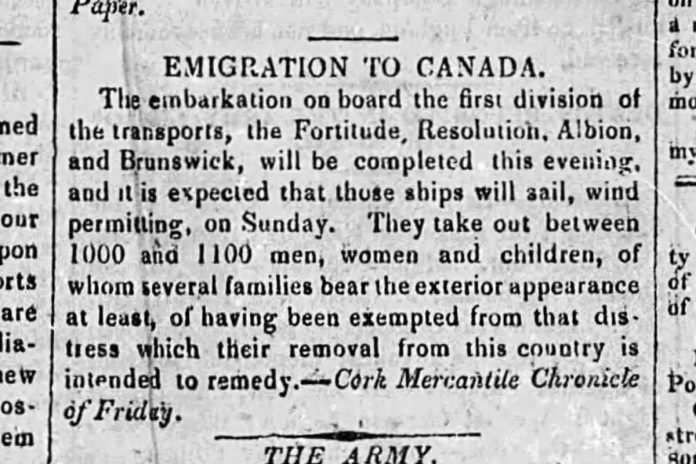
“Those chosen (for emigration) were very special but they had to leave their brothers and sisters and other family members behind, which was very traumatic because they knew they would never make the trip back home,” says Brendan Moher, whose ancestors later came to this area in 1832.
“It was a well-run operation by the British government. There was a doctor on each of the ships. But it was 1825 and it wasn’t like hopping on a ship in 1910. This was the Atlantic. There were storms and everything else. Some died on the way over, but almost exactly the same number arrived because of the 17 births that occurred on the ships.”
Last Monday (January 6), Moher, in his role as chair of Nine Ships 1825 Inc., made a presentation to Peterborough city councillors. Watching on were other members of the group: longtime local historians Elwood Jones and Dennis Carter-Edwards, Peterborough Canadian Irish Club board member Maureen Crowley, and former Selwyn mayor Mary Smith.
During his presentation, Moher asked the city to officially proclaim this year as the 200th anniversary of the Peter Robinson Irish emigration, as well as provide some relief in terms of fees owing for the rental of city facilities as needed for any related commemoration events.
On Tuesday, January 21st at the Peterborough Lions’ Community Centre on Burnham Street in East City, the first of what will be many public events commemorating the bicentennial will be hosted by the Peterborough Historical Society. Set for 7 p.m., the gathering will provide an overview of the history of the emigration.
Much of the same detail is laid out at nineships1825.com, including a full listing of each ship’s passenger roster, a timeline of events related to the emigration, and details of commemorations that were held in 1925 and 1975, to mark 100 and 150 years respectively.
According to Crowley, while details are still a work in progress, local events planned for this year will have a decidedly Irish connection. That includes, but isn’t limited to, the 25th annual Peterborough St. Patrick’s Day Parade on March 16 and 4th Line Theatre’s July 29 to August 30 world premiere staging of Wild Irish Geese, Megan Murphy’s take on the Peter Robinson Irish emigration from the perspective of those who made the arduous trek.
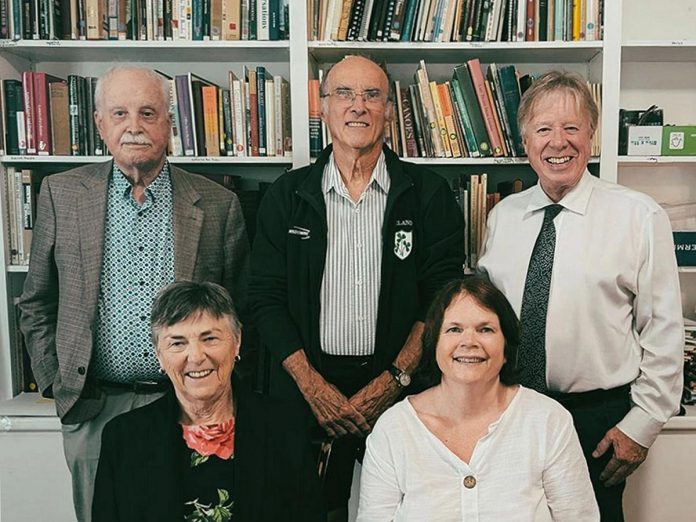
“We have community partners — Downeyville, Ennismore, Young’s Point, Keene, Otonabee, Douro — all having different (commemoration-related) events throughout the year,” says Crowley, a descendant of 1825 Irish emigrants with the surnames Crowley, Condon, Leahy, Allen, Fitzgerald, and Clancy.
“There are research weekends, a commemoration of the ships in Asphodel Norwood, Trent Valley Archives’ presentation of the play Crossing Over in May, a garden planting in Downeyville in June, a picnic and family reunion for Douro’s 200th anniversary July 4 to 6,” he says. “Ennismore has Heritage Days July 12 and 13, Downeyville has its Heritage Day July 19, and Young’s Point will have a 200th anniversary commemoration as well.”
August 1 to 10, notes Crowley, will be the bicentennial’s “focus week” during which time the Civic Holiday — long recognized as Peter Robinson Day in Peterborough — falls.
“We’re expecting people from all over the world,” says Crowley. “We’ve had interest already from the United States and from Ireland. There’ll be a walking tour on August 1 hosted by Elwood Jones of Trent Valley Archives, and a week-long Bicentennial Heritage Fair at the Knights of Columbus Hall at 317 Hunter Street West.”
On August 2, adds Crowley, will be the gala event, in the form of the Grand Irish Gathering at the Canadian Canoe Museum. That reception will feature music by Lakefield’s Hunt the Hare and other local musicians. More details of this event, and all the others, will be posted on the Nine Ships 1825 Inc. website as they’re finalized.
Moher says the committee, since it was formed, has viewed the year-long remembrance of the 1825 Irish emigrants as a more of a commemoration than a celebration.
“It wasn’t really a perfect situation for the First Nations when 2,000 people arrived,” he says of Irish emigrants’ arrival and settlement.
“They (First Nations people) aren’t celebrating, but they respect that we’re having a commemoration. They came out to our launch (in July 2024). It’s a celebration in some respects, but really a commemoration.”
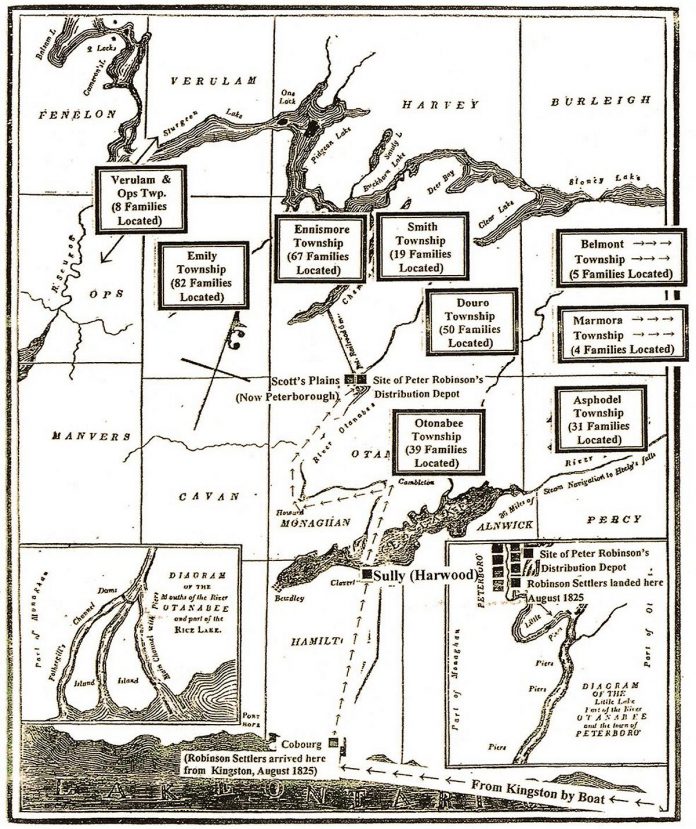
Moher acknowledges that for himself and his fellow committee members, planning for the commemoration is “a labour of love” but well worth the effort. Now, both he and Crowley are excited the year has arrived.
“We want to make sure this event doesn’t go by unrecognized,” says Moher, noting initial planning began in 2015 and involved members of the Peterborough Canadian Irish Club, local heritage groups, and city and county stakeholders.
“This is a big deal. Forty per cent of people in this area trace their roots back to Ireland, so it’s very important to the history of the region that this be commemorated and acknowledged — how important it is that the Irish came here and established themselves.”
“And they did a good job of it,” Moher adds. “They created a foundation we can all be proud of and build upon, not just now but into the future. The Irish are a bit clan-ish, so they tend to stick around home. I’m sure, for generations to come, there’ll be lots of Irish living in this area. For the 300th anniversary, I’m sure they’ll look back and see what we did and do something at that time.”
For her part, Crowley says “I am who I am because of the combination of all my ancestors. I’ve always been proud of my Irish history and those connections. If it wasn’t for those people (the 1825 Irish emigrants), I wouldn’t be here.”
For more information, including upcoming events, and to sign up for the bicentennial newsletter, visit nineships1825.com.


























